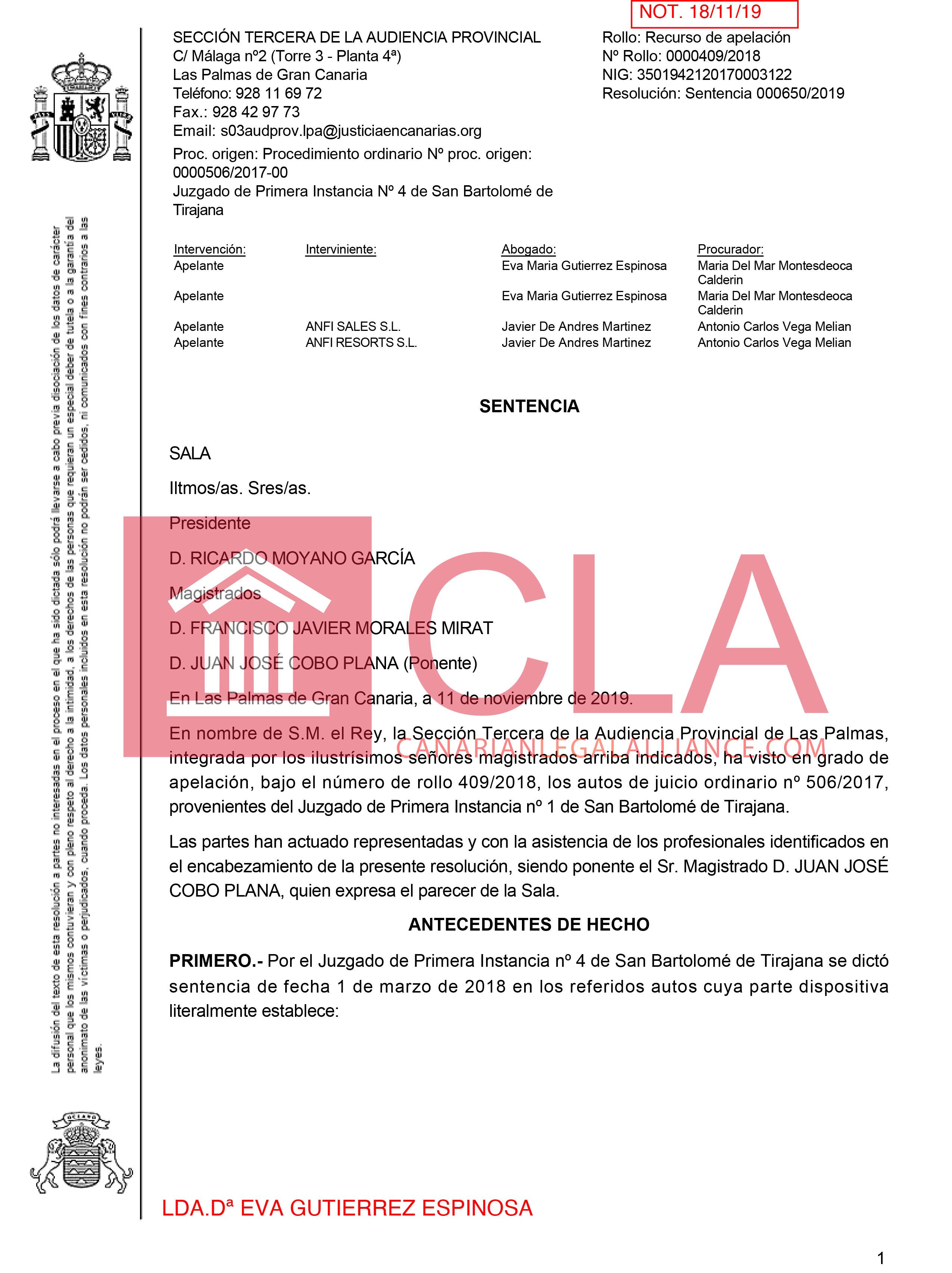Canarian Legal Alliance is pleased to announce yet another victory at the High Court in Las Palmas. This case centred its appeal regarding the unlawful taking of deposits within the statutory reflection period as per Spanish Timeshare Law (42/98).
At the Court of First Instance, the Judge has already declared the contract null and void, however, he had not appreciated the illegality of any payment contrary to the law as there was no specific documentary proof for the transaction which would indicate payments in the first three months after signing the contract.
In this case the payment was made by our German Client via his credit card to the value of 7,969 Deutsch Marks. This was paid on the same day and at the same time which he signed the contract. The magistrates in the High Court stated that the contract itself is sufficient proof, as it states the date for the first payment the same day when the clients signed the contract.
They say:
“About the payment made by credit card on the same day of the signing of the contract for an amount of 7,969 DM, the contract itself makes full proof of it.
There is also no doubt that the document was written by the defendants. It is not plausible, nor credible that Anfi received an amount of money on the same day of the signature (the day Anfi wrote the contract) if it was not received.
This way, the same document proves the payment was made and on that date as recognized and elaborated by the defendant”
It is a well-known practice with timeshare contracts that the resorts want to ensure the clients do not cancel, as is their statutory right, by forcing them to pay deposits.
The judges themselves state:
“In fact, it is more than usual practice for Anfi to receive payments on the same day of the signature, although this involves infringing Article 11 of Law 42/1998”
“It is more than evident that the payment was made on the day of the signature and therefore it is not necessary to provide more proof to prove the said payment, since if Anfi had not received any payment on the day of the signature it would not have indicated or recorded in the contract the receipt of such payment.”
CLA is pleased to hear that the magistrates from the High Court agreed with our arguments, and we hope this will benefit future rulings where our clients were not able to obtain proof of payments, at least for the amounts paid on the day of signing the purchase contract.
And for those who seek more information on the unlawful taking of deposits, below is Article 11 of law 42/98 and the updated version set out in Law 4/12.
Article 11. Prohibition of advances. 1. any advance payment is prohibited by the acquirer to the transferor before the deadline for exercising the right of withdrawal or has the power while resolutions to which the preceding
Article. However, the parties may establish the covenants and conditions as they consider appropriate to ensure payment of the deferred price, provided they are not contrary to the ban and do not involve the transferor receive, directly or indirectly, any consideration in cases of exercise of that power to desist.
2. If the acquirer would advance any amount to the transferor is entitled to demand at any time recover that amount doubled, and may choose among terminate the contract within three months of its conclusion or to require full compliance.

This was also reinforced in the updated Timeshare Law 4/12.
Article 13. Prohibition of payment of advances. 1. In contracts for the use of property for tourist use, long-term holiday product and exchange, the payment of advances, the constitution of guarantees, the reserve of money in accounts, the express recognition of debt or any other consideration for the employer or a third party and the consumer, before the end of the withdrawal period.
2. The same prohibitions are established in respect of resale contracts, before the sale has actually taken place or the contract has been terminated by other means. 3. The acts carried out against this prohibition are null and void and the consumer may claim double the amounts delivered or guaranteed by such concepts.
CLA would like to congratulate and thank the legal team for their hard work and diligence in this case. We would also like to thank our German client for putting their trust in CLA.
If you would like further information on the illegality of taking payments within the cooling-off period and would like to know how this affects you, please contact us using our contact page and we will get back to you.



